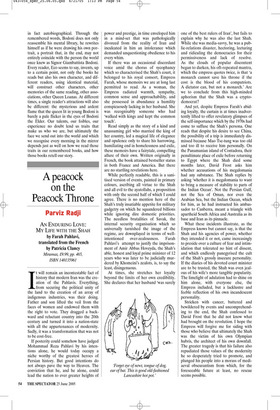A peacock on the Peacock Throne
Parviz Radji
AN ENDURING LOVE: MY LIFE WITH THE SHAH by Farah Pahlavi, translated from the French by Patricia Clancy Miramax, £9.99, pp. 465, ISBN 140135961 It will remain an incontestable fact of history that modern Iran was the creation of the Pahlavis. Everything, from securing the political unity of the land to the creation of an array of indigenous industries, was their doing. Father and son lifted the veil from the faces of women and endowed them with the right to vote. They dragged a backward and reluctant country into the 20th century and turned it into a nation-state with all the appurtenances of modernity. Sadly, it was a transformation that was not to be cost-free.
If posterity could somehow have judged Mohammad Reza Pahlavi by his intentions alone, he would today occupy a niche worthy of the greatest heroes of Persian history. But good intentions do not always pave the way to Heaven. The conviction that he, and he alone, could lead the nation to ever greater heights of power and prestige, in time enveloped him in a mind-set that was pathologically divorced from the reality of Iran and inculcated in him an intolerance which demanded unquestioning obedience to his every whim.
If there was an occasional discordant voice amid the chorus of sycophancy which so characterised the Shah’s court, it belonged to his royal consort, Empress Farah, whose memoirs we are at long last permitted to read. As a woman, the Empress radiated warmth, sympathy, common sense and approachability, and she possessed in abundance a humility conspicuously lacking in her husband. She was recognisably someone who had ‘walked with kings and kept the common touch’.
Read simply as the story of a kind and unassuming girl who married the king of her country, led a magical life of elegance and opulence only to share his harrowing, humiliating end in homelessness and exile, these memoirs have a fairytale, compelling allure of their own. Written originally in French, the book attained bestseller status in both France and America. But there are no startling revelations here.
While perfectly readable, this is a sanitised version of events, painted in primary colours, ascribing all virtue to the Shah and all evil to the ayatollahs, a proposition with only the second half of which I could agree. There is no mention here of the Shah’s truly insatiable appetite for military gadgetry on which he squandered billions while ignoring dire domestic priorities. The needless brutalities of Savak, the internal security organisation which so universally tarnished the image of the regime, are downplayed in terms of wellintentioned over-zealousness. Farah Pahlavi’s attempt to justify the imprisonment of Amir Abbas Hoveyda, the Shah’s able, honest and loyal prime minister of 12 years who was later to be judicially murdered by Khomeini’s zealots, is, to say the least, disingenuous.
At times, she stretches her loyalty beyond the limits of her own credibility. She declares that her husband ‘was surely one of the best rulers of Iran’, but fails to explain why he was also the last Shah. While she was media-savvy, he was a public-relations disaster, hectoring, lecturing and ridiculing the democracies for their permissiveness and lack of resolve. As the clouds of popular discontent began to darken, his oft-repeated mantra, which the empress quotes twice, is that ‘a monarch cannot save his throne if the cost is the blood of his compatriots. A dictator can, but not a monarch.’ Are we to conclude from this high-minded aphorism that the Shah was a cryptodemocrat?
And yet, despite Empress Farah’s abiding loyalty, the curtain is at times inadvertently lifted to offer revelatory glimpses of the self-importance which by the 1970s had come to suffuse the Shah’s persona. One reads that despite his desire to see China, the possibility of a trip is immediately dismissed because Mao Tse-tung was too old and too ill to receive him personally. On the Panamanian island of Contadora, their penultimate place of exile before returning to Egypt where the Shah died some months later, David Frost asks him whether accusations of his megalomania had any substance. The Shah replies by asking ‘whether it is megalomania to want to bring a measure of stability to parts of the Indian Ocean’. Not the Persian Gulf, not the Sea of Oman, nor even the Arabian Sea, but the Indian Ocean, which for him, as he had instructed his ambassador to Canberra, meant a triangle with apartheid South Africa and Australia as its base and Iran as its pinnacle.
What these incidents illustrate, as the Empress knows but cannot say, is that the Shah and his agencies of power, whether they intended it or not, came increasingly to preside over a culture of fear and intimidation that tolerated no hint of dissent, and which endlessly panegyrised the cult of the Shah’s grossly insecure personality. If the diaries of his devoted court minister are to be trusted, the Shah was even jealous of his wife’s more tangible popularity. The limelight of adulation had to shine on him alone, with everyone else, the Empress included, but a lacklustre and feeble reflection of his own incandescent personality.
Stricken with cancer, battered and bewildered by events and uncomprehending to the end, the Shah confessed to David Frost that he did not know what had brought on the revolution. I hope the Empress will forgive me for siding with those who believe that ultimately the Shah was the victim of his own Olympian hubris, the architect of his own downfall. The greater tragedy is that his failure also repudiated those values of the modernity he so desperately tried to promote, and plunged his people into a morass of mediaeval obscurantism from which, for the foreseeable future at least, no rescue seems possible.


































































 Previous page
Previous page